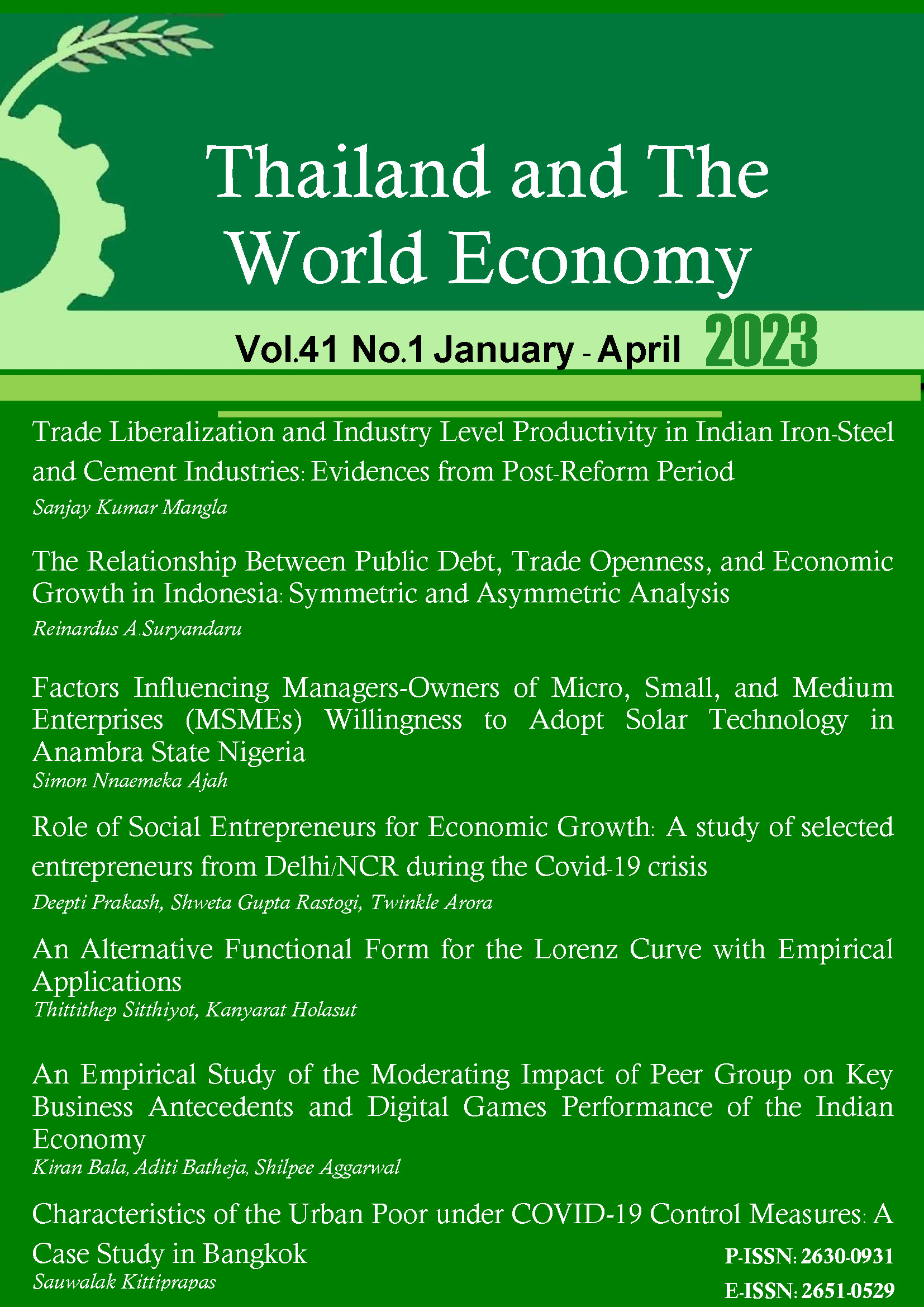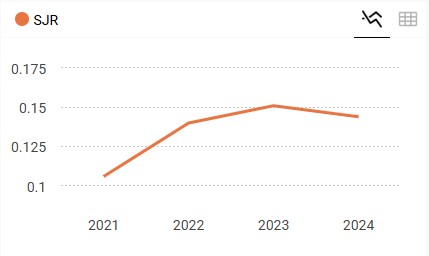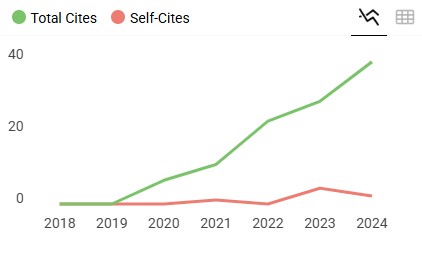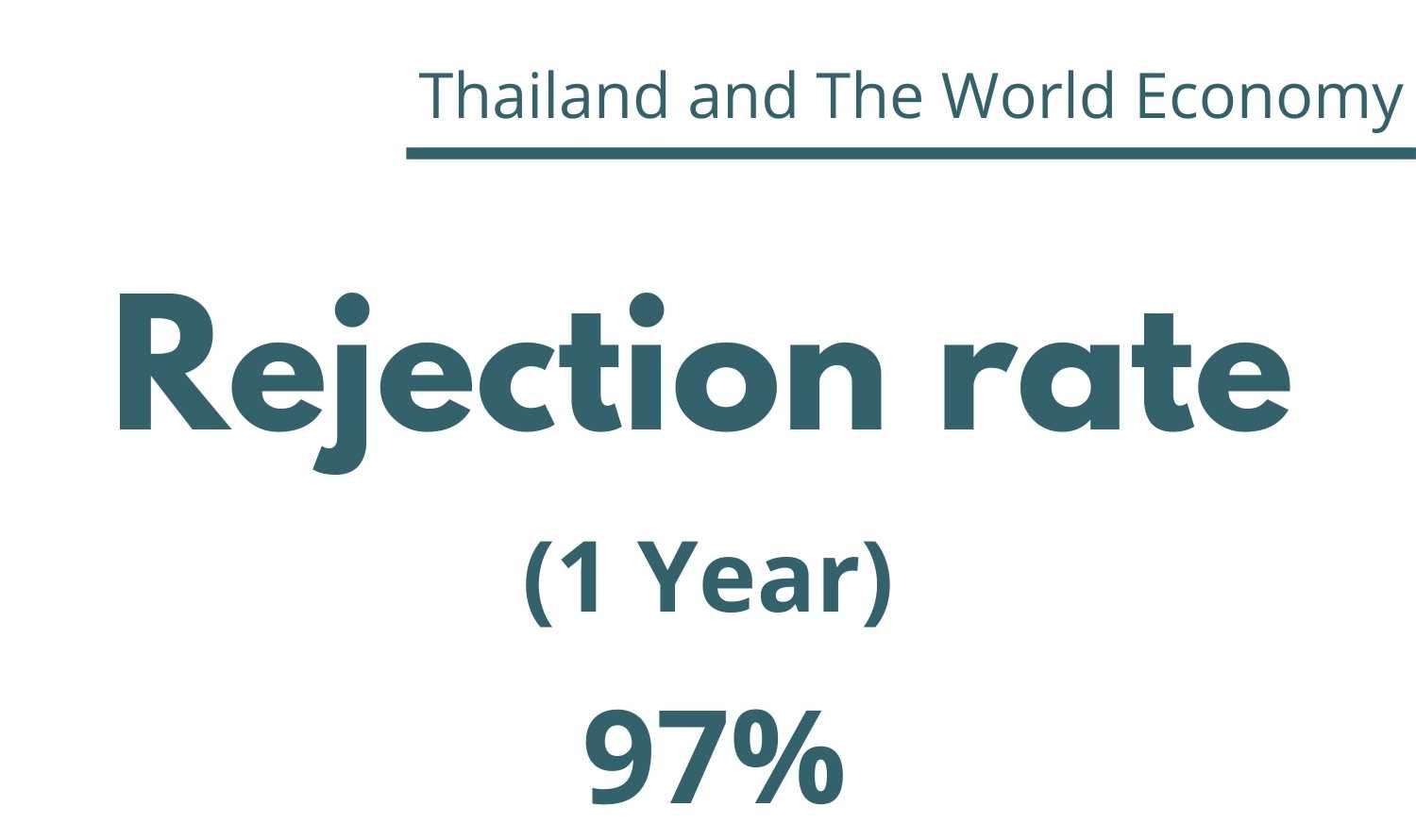Characteristics of the Urban Poor under COVID 19 Control Measures: A Case Study in Bangkok
Keywords:
COVID-19, Urban Poor, Poverty, Slums, Social Protection Policy, Bangkok, ThailandAbstract
The study aims to investigate the effects of COVID-19 and highlight characteristics of the urban poor during the COVID-19 outbreak in Bangkok. The study utilizes data from community surveys with multi-stage sampling to obtain a total of 500 samples in the slums during the first lockdown in Bangkok and displays results in descriptive statistics and empirical tests using binary and order logit models. Results show that the poor have faced the most adverse socioeconomic impacts during the COVID-19 outbreak with restrictive controls, such as experiencing the largest income reduction and deficit as well as an increasing debt ratio. Binary logit estimations indicate that the poor are likely to be those with low education and be unemployed both during and after the lockdown periods. Unemployment during the lockdown had the largest significant effect on poverty and an even greater effect in the post-lockdown. In addition, age is another significant factor for the poor after the lockdown, indicating the possibility for older-aged workers and the elderly to become poor in the post-COVID period. Ordered logit estimations also reveal that aging has a negatively significant relationship to income level after the lockdown, while women tend to drop their income levels significantly during the lockdown when there was high unemployment. Therefore, policies should be prepared to mitigate adverse effects of the vulnerable groups. Not only should short-term policies and welfare schemes be provided during the lockdown, but policies must also be considered with a long-term human development approach in the post-COVID world. This study suggests social protection policies with comprehensive and potential concerns.
References
Attanasio, O.,& Rajan, R. (2020) The invisible COVID-19 graveyard: Intergenerational losses for the poorest young people and actions to address a human development pandemic, (COVID19 | POLICY DOCUMENTS SERIE. UNDP LAC C19 PDS No. 26), UNICEF and UNDP LAC. Retreived from www.latinamerica.undp.org
Bangkok Metropolitan Administration (2020). Community Statistics in BMA. Bangkok:Department of City Planning and Development, BM (in Thai).
Boza-Kiss, B., Pachauri, S., & Zimm, C. (2021). Deprivations and inequities in cities viewed through a pandemic lens. Frontiers in Sustainable Cities, 3: 645914.
Bukari, C., Essilfie, G., Abigail Aning-Agyei, M, Christopher O.I , Christian Kyeremeh , Aowusu, A.A. , Amuquandoh K.F.,& Bukari, K.I.| (2021). Impact of COVID-19 on poverty and living standards in Ghana: A micro-perspective. Cogent Economics & Finance, 9 (1), 1879716.
Bundervoet, T., Ddvalos, M.,& Garcia, N. (2021). The short-term impacts of COVID-19 on households in developing countries An Overview Based on a Harmonized Data Set of High-Frequency Surveys. World Bank Policy Research Working Paper No WPS9582, Washington DC: World Bank
ESCAP (2021). Economic and social survey of Asia and the Pacific 2021: Towards post-COVID resilient economies. Bangkok : Bangkok, UNESCAP
Josephson, A., Kilic, T., & Michler, J.D. (2021). Socioeconomic impacts of COVID-19 in low-income countries. Nature Human Behaviour, 5, 557–565 .
Greyling T, Rossouw S, & Adhikari T (2021) The good, the bad and the ugly of lockdowns during Covid-19. PLoS ONE, 16(1), e0245546 https://doi.org/10.1371/journal.pone.0245546
Grilli L., & Rampichini C. (2014). Ordered logit model. In: Michalos AC (Ed.). Encyclopedia of Quality of Life and WellBeing Research. Dordrecht, Netherlands: Springer, pp 4510-4513.
Hevia, C., & Neumeyer, A. (2020). A conceptual framework for analyzing the economic impact of COVID-19 and its policy implications. COVID-19 Policy Document Series, New York: UNDP LAC.
ILO.(2020). Social Protection Outlook. ILO Brief: May.
IMF (2020). World economic outlook: A long and difficult ascent. Washington DC: The International Monetary Fund.
Kittiprapas, S. (2022). Socioeconomic Impacts of the COVID-19 Pandemic on the vulnerable households: Empirical evidence from slum areas of Bangkok city. Cogent Social Sciences, 8(1), 2074111
Kittiprapas, S., &Terdudomtham, T. (2021). COVID-19 and Economic Problems of the Urban Poor. Business Administration and Economic Review, 17 (2), 17-35 (in Thai).
Kittiprapas, S.,Terdudomtham, T., Pakthanapakorn, P. & Sokchabok, P. (2020). COVID-19: Social Impacts of COVID-19 Pandemic and Economic Crisis. Bangkok: Office of the Permanent Secretary, Ministry of Social Development and Human Security. (in Thai)
Kharas, H.& Dooley, M. (2021). Long run impacts of extreme poverty. Brooking. Retrieved from https://www.brookings.edu/blog/future-development/2021/06/02/long-run-impacts-of-covid-19-on-extreme-poverty/
King, J. (2008). Binary logistic regression. In Osborne, J. (Ed.), Best practices in quantitative methods (pp. 358-384). SAGE Publications, Inc., https://dx.doi.org/10.4135/9781412995627
Laborde, D., Martin, W, Swinnen, J, & Vos, J. (2020). COVID-19 risks to global food security. Science , 369 (6503), 500-502.
Laborde, D., Martin, W,& Vos, J. (2021). Impacts of COVID-19 on global poverty, food security, and diets: Insights from global model scenario analysis. Agricultural Economics, 52 (3), 375-350.
Lekfuangfu, Warn N., Suphanit Piyapromdee, Ponpoje Porapakkarm,& Nada Wasi. (2020). On Covid-19: New implications of job task requirements and spouse’s occupational sorting. PIER Discussion Paper No. 133. Retrieved
from https://www.pier.or.th/en/dp/133/
Loayza & Pennings (2020). Research and Policy Briefs: The World Bank Group. Retrieved from https://documents1.worldbank.org/curated/en/951811585836124198/pdf/Macroeconomic-Policy-in-the-Time-of-COVID-19-A-Primer-for-Developing-Countries.pdf
Long, J.S. & Freese, J (2006). Models for binary outcomes: The statistical model. Regression Models for Categorical Dependent Variables Using Stata, Second Edition. Stata Press. pp. 131–136.
Minahan J, Falzarano F, Yazdani N, & Siedlecki KL. (2021). The COVID-19 pandemic and psychosocial outcomes across age through the stress and coping framework. Gerontologist, 61(2),228-239.
McCann, P. (2001). Urban and Regional Economics. New York: Oxford University Press.
Otker-Robe, I, & Podpiera, A.M. (2014). The social impact of financial crises evidence from the global financial crisis. Policy Research Working Paper No. 6703. Washington DC: World Bank.
Ponpunthin, N. (2021). Are Thai non-agricultural workers financially fragile? , Thailand and the World Economy, 39(2), 18-36.
United Nations. (2020). Shared responsibility, global solidarity: Responding to the socio-economic impacts of COVID-19. New York: The United Nations.
Oxford Policy Management and United Nations Thailand. (2020). Social Impact Assessment of COVID-19 in Thailand. United Kingdom: Oxford Policy Management United.
Wong Sing Yun (2020). Spcial review: Review of economic implications of COVID-19. Thailand and The World Economy , 38(1), 75-82.
William, R. (2016). Understanding and interpreting generalized ordered logit models. The Journal of Mathematical Sociology, 40(1),7-20.
World Bank(2020). Poverty and Shared Prosperity 2020: Reversal of Fortune. Washington DC: The World Bank.
World Bank. (2021). Thailand Economic Monitor January 2021: Restoring Incomes; Recovering Jobs. Bangkok: The World Bank.
Yamane, T. (1967). Statistics: An Introductory Analysis (2nd ed.). New York: Harper and Row.
Yonzan, N., Lakner, C., Mahler, D.G., Aguilar, R., & Wu, H (2020) The impact of COVID-19 on global poverty under worsening growth and inequality. World Bank Blog. Retrieved from https://blogs.worldbank.org/opendata/impact-covid-19-global-poverty-under-worsening-growth-and-inequality
WHO. (2020). Impact of COVID-19 on people's livelihoods, their health and our food systems. Retrieved from https://www.who.int/news/item/13-10-2020-impact-of-covid-19-on-people's-livelihoods-their-health-and-our-food-systems
Downloads
Published
How to Cite
Issue
Section
License
Copyright (c) 2023 Thailand and The World Economy

This work is licensed under a Creative Commons Attribution-NonCommercial-NoDerivatives 4.0 International License.










